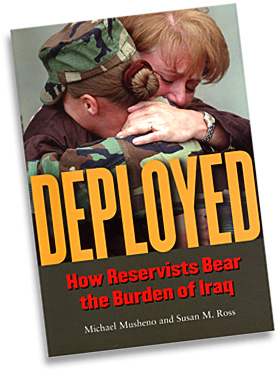New on the SF State bookshelf
May 2, 2008 -- "How long is enough?" is the question that many army reservists are asking, after serving lengthy terms of duty in Iraq and Afghanistan. SF State Professor of Criminal Justice Studies Michael Musheno's new book "Deployed," gives voice to the citizen soldiers that the U.S. Army has come to rely on so heavily.
Since Sept. 11, so-called "weekend warriors," the part time soldiers who help during disaster situations on American soil, have become full-time soldiers in a war with no clear boundaries between the combat zone and support services. In "Deployed," Musheno and co-author Susan M. Ross, associate professor of sociology and chair of criminal justice at Lycoming College, describe today's reservists as the new conscripts of the 21st-century U.S. Army.
Using soldiers' own voices, Musheno and Ross unravel the tapestry of reservists' lives: their military duties, civilian careers, family relations and lives they put on hold while deployed overseas. The book follows a unit from the mid-atlantic states.

"When we listened to the voices of 46 members of the military police unit, we found neither a potpourri of individual stories nor a singular meta-story of 'the citizen soldier' experience," Musheno said. The book identifies three clusters of reservists: adaptive reservists who adjust quickly to life at war; struggling reservists who experience troubles which are more homegrown than related to their service in a war zone; and resistant reservists, some of whom oppose the war as they serve in Iraq.
"One thing unites all three," Musheno said. "They have grown distrustful of the military and uncertain about their futures, not knowing whether there is any end to their volunteering to serve their country."
Musheno and Ross highlight the honorable way reservists are serving in Iraq while facing uncertainty surrounding length of service and long deployments in an unpopular war.
Following is an excerpt from the book:
In retrospect, while the jolt, anger and patriotism generated by 9/11 propelled many of the members of the 893rd unhesitatingly to accept or even volunteer for the initial call to duty, they were ultimately unprepared for the reality of being an integral component of fighting the wars in Afghanistan and Iraq. Even reservists with considerable experience were shocked by the length of their deployments and time away from home. Looking back on their deployments, Jeremy Easton, a sergeant (noncommissioned officer) with eight years of professional soldiering in the active component under his belt plus six years in the reserves reflects the sentiments of many:
"One year was rough [in Iraq]. We did it, so I guess a year is feasible. But you've got guys goin' out now that are looking at eighteen months and twenty-four months. That's just too much. That's too much to ask somebody who's got a whole other life to take care of, so. It's one thing when you join and that's your sole purpose on the active component. You know that's what's expected of you, so you don't really have any place to complain. But even in the reserve component, you kinda expect, you kinda know you have an obligation, or you should know that you have an obligation, but I don't think anybody was ready for -- I know that nobody in this company was ready for what we got hit with the last two years."
-- Michael Musheno and Susan M. Ross, "Deployed: How Reservists Bear the Burden of Iraq" (University of Michigan Press, 2008). Excerpt reprinted by permission of the publisher.
-- Elaine Bible
Share this story:
